Dear Reader, in this age of AI created content, please support with your goodwill someone who works harder to provide the human-made. Sign up at the top of the lefthand column or bottom of this page. You will receive my hand illustrated monthly newsletter RESTORE NATURE and access to the biodiversity garden design course as I write...and nothing else, I respect your time. I am also removing the advertizing as best I can as its become intrusive inappropriate and pays me nothing.
"Kraut" and other styles of lacto fermentation with salt
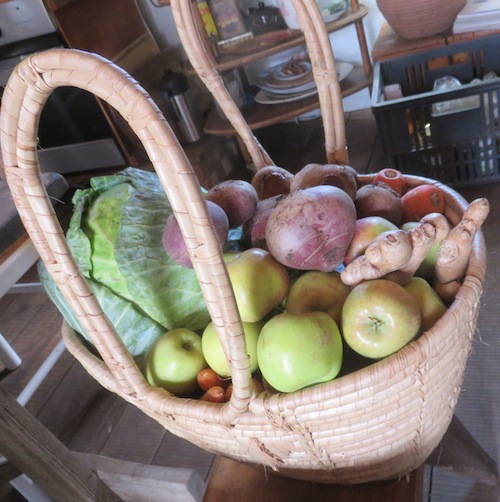 Any vegetables can be used for salt ferments
Any vegetables can be used for salt fermentsKraut style fermentation
I did not know ‘kraut’ was a generic term to describe a type of salt fermentation, but thought it only designated German lacto fermented cabbage, till a few weeks back I went to a beautiful workshop at Cape Point nursery. The workshop was presented by Zayaan Khan, whose fields of interest embrace among others, seed sovereignty, the surplus people’s project, and preserving food with fermentation.
Kraut style involves adding approximately 2% salt by weight to vegetables which have been finely cut up. They are then, as is also found in German tradition, pounded until they release their juices, which is the only liquid which covers the vegetable or fruit.
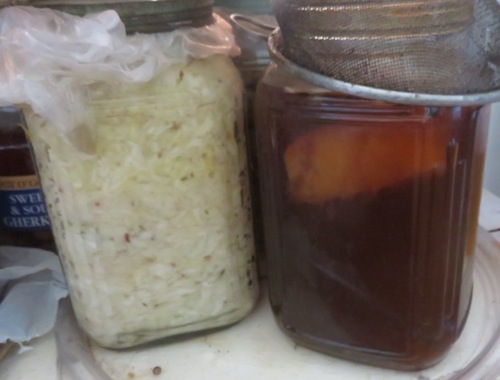 My take home from the workshop: left is Kraut from 2 large white cabbages, right is Kombucha, a sugar and tannin ferment
My take home from the workshop: left is Kraut from 2 large white cabbages, right is Kombucha, a sugar and tannin fermentBrine fermentation
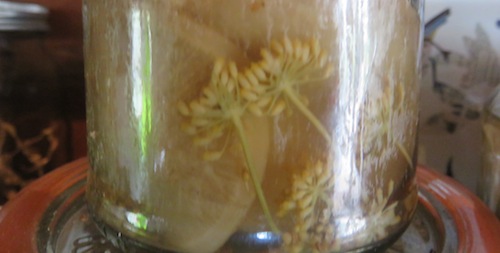 lemon and dill in brine
lemon and dill in brine garlic ferment
garlic fermentIn brine fermentation you basically add about 4% salt by
weight to the vegetable and then top up with water or other liquid, whereas Kraut style ferments in its own juices. This method is
great for chunky pieces or whole fruit or vegetables like olives, sweet peppers, chilis, beans,
carrots, cucumbers and so forth. It is better to weigh the vegetable matter and
base the salt quantity on that, than to make up a brine of a particular
concentration first and pour it over the vegetable. If there is a lot of
airspace you will have a strong brine and if there is little airspace for the
brine to run into you will end up with too little salt to preserve it.
I presume the liquids added to brine ferments can be things
like water, wine, vinegar, and starter mixes like liquid taken from other
ferments, whey, which is full of lactobacteria and so forth. However, as Zayaan
frequently underlined there are so many ways of doing this its hard to
generalize.
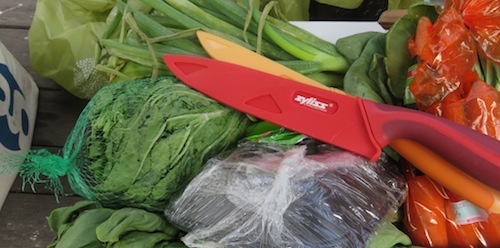 fresh and not so fresh produce into the jar
fresh and not so fresh produce into the jar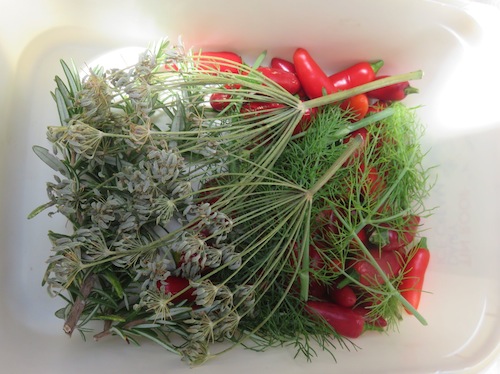 typical flavourings for pickles
typical flavourings for picklesGetting in a creative ferment
 Zayaan explains some of the health benefits of pickling
Zayaan explains some of the health benefits of picklingZayaan encouraged us to play, and play we did. Zayaan has been known to try anything, and her pickling skills extend to trying out preserving insects in hot spices ! With such a fab and creative mentor, we could not help but have our flame lit, and I don’t know about the other attendees, but I came home and pickled for two days and have been pickling stuff regularly since then.
We make kombucha, kefir, pumpkin and dill flower pickle, achar, numnum in whey brine, and in sugar, peach done with sugar fermentation, in the shade and in full sun and my own invention, the residue from wild fruit vinegar making, a pear mousse that is really ancient and alcoholic by now, dark brown and still fruity. But my favourite preservation technique is not even really a pickle, it is the Moroccan style salt and lemon preserve that Zayaan gave us a recipe for in the large beautifully illustrated download we were sent after the workshop. But it’s a simple recipe anyway, once you’ve seen it and done it you will remember it.
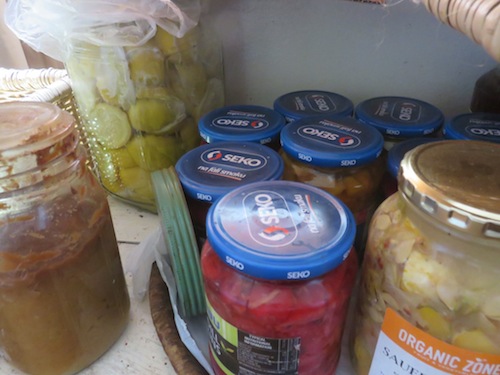 My eccentric home brews: from left to right: alcoholic pear paste, Moroccan lemon preserve, sweet peach pickles, numnum and pumpkin in brine and the kraut and kombucha pictured before
My eccentric home brews: from left to right: alcoholic pear paste, Moroccan lemon preserve, sweet peach pickles, numnum and pumpkin in brine and the kraut and kombucha pictured before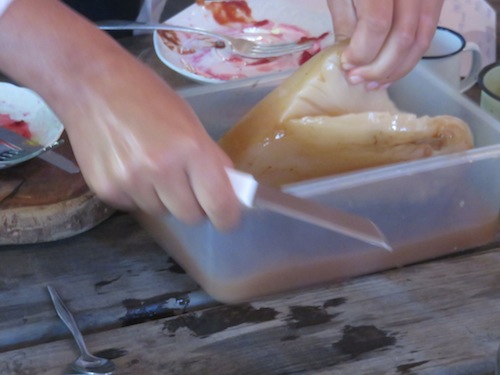 This thing is a scoby, a gelatinous body built by yeast and bacteria in kombucha. It was shared out between us to take home.
This thing is a scoby, a gelatinous body built by yeast and bacteria in kombucha. It was shared out between us to take home.The beautiful Veld and Sea
kitchen classroom
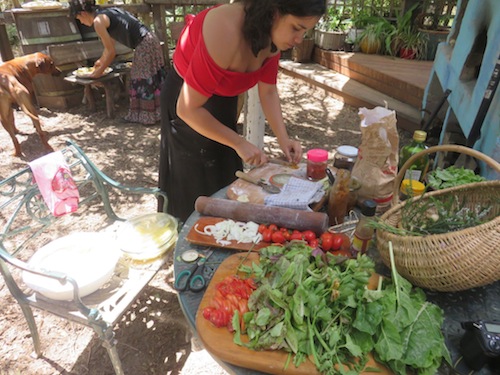 wild and west on pizza
wild and west on pizza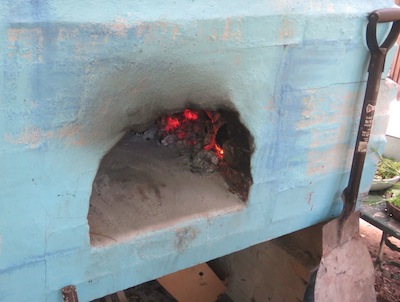 the glowing pizza oven
the glowing pizza oven our exquisite lunch
our exquisite lunch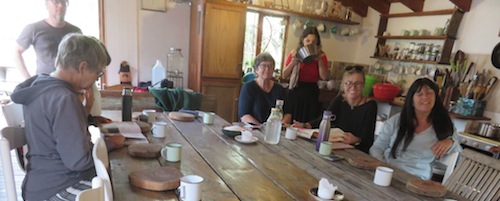 lovely happy people having fun at the workshop
lovely happy people having fun at the workshopThe workshop was spent with lovely people some of whom had a lifetime of experience of pickling and shared a lot of this lore. The nursery was gorgeous, an island of green in the burned landscape. They must have been through scary times this past year.
The venue at the nursery, known as Veld and Sea kitchen classroom, was in a little low beamed cottage with shelves bulging with delicious and diverse ferments. The host, Roushanna is an expert on indigenous foods and foraging, and we used wild rosemary and russ among other native spices, to flavour our pickles, while Roushanna spent the day preparing one pizza after another for us, each more delicious than the last. I couldn’t help myself when I saw the plants in the nursery, and splashed out on fynbos edibles which traveled home in the boot of my car with the new pickles.
 We are not the only ones eyeing the food We are not the only ones eyeing the food |
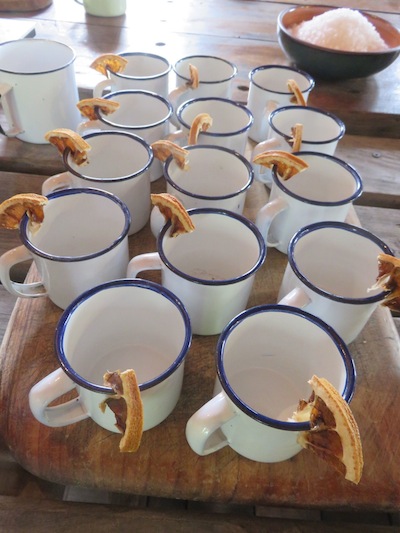 smokey kombucha and spicey chai flowed smokey kombucha and spicey chai flowed |
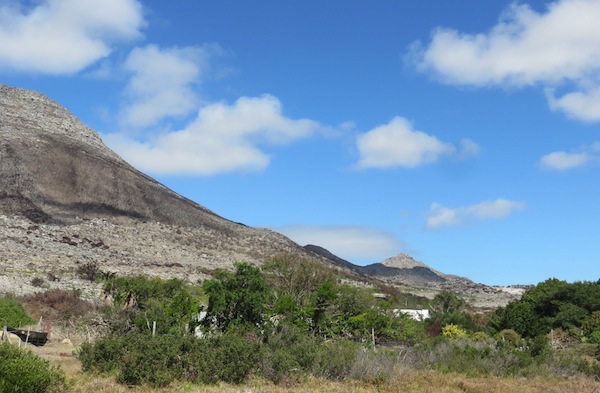 The nursery is an oasis of green in the gray Cape Point firescape
The nursery is an oasis of green in the gray Cape Point firescape------
home page for lots of links to easy natural gardening methods
------
growing vegetables the natural low cost way
------
another article on Zayaan Kahn's food and activism
Ask us ?
If you have any questions please let us know !
Restore Nature Newsletter
I've been writing for four years now and I would love to hear from you
Please let me know if you have any questions, comments or stories to share on gardening, permaculture, regenerative agriculture, food forests, natural gardening, do nothing gardening, observations about pests and diseases, foraging, dealing with and using weeds constructively, composting and going offgrid.
SEARCH
Order the Kindle E-book for the SPECIAL PRICE of only
Prices valid till 30.09.2023
Recent Articles
-
garden for life is a blog about saving the earth one garden at a time
Apr 18, 25 01:18 PM
The garden for life blog has short articles on gardening for biodiversity with native plants and regenerating soil for climate amelioration and nutritious food -
Cape Flats Sand Fynbos, Cape Town's most endangered native vegetation!
Apr 18, 25 10:36 AM
Cape Flats Sand Fynbos, a vegetation type found in the super diverse Cape Fynbos region is threatened by Cape Town's urban development and invasive alien plants -
Geography Research Task
Jan 31, 25 11:37 PM
To whom it may concern My name is Tanyaradzwa Madziwa and I am a matric student at Springfield Convent School. As part of our geography syllabus for this
"How to start a profitable worm business on a shoestring budget
Order a printed copy from "Amazon" at the SPECIAL PRICE of only
or a digital version from the "Kindle" store at the SPECIAL PRICE of only
Prices valid till 30.09.2023







